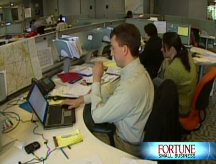Seller's remorse
How I nearly lost my company - and then got it back.
NAPA, CALIF. (Fortune Small Business) -- I launched SysOpt.com as a hobby business back when I was in high school. It was a community for tech-savvy people looking for tips to make their computers run faster.
Around the same time, in the early 1990s, I launched ResellerRatings.com to help consumers identify safe shopping sites. Advertising sales for the two Web sites were earning me an annual profit of $100,000 from my senior year of high school through my sophomore year of college, at which point I dropped out to pursue the businesses full time.
Out of the blue in 1999, an IT-industry Web site called Andover.net offered me hundreds of thousands of dollars to buy SysOpt and ResellerRatings. I was a 20-year-old with dollar signs in my eyes, and I was ecstatic.
To make sure my company was being valued properly, I approached an Andover competitor, EarthWeb, and asked it to name a price for my site. I didn't know how to pit Andover against EarthWeb so I told each party what the other's offer was. Obviously I should have kept that information to myself and just let them keep bidding higher. But in the end EarthWeb won by doubling its initial offer to around $4 million. The buyout was half in stock and cash and half through a structured earn-out based on the growth of SysOpt's page views.
But even though I had spent many stressful months negotiating the sale agreement with the help of a lawyer, the transaction was flawed. I had never sold a company or dealt with that kind of money before, and I was in way over my head.
In the months after the sale, I thought I was set for life. After I got the initial cash payment, I began spending recklessly.
I bought a $65,000 Porsche Boxster and an $11,000 piano. I have never taken piano lessons and can't read music, but I discovered a new talent when I learned to play Beethoven's "Moonlight Sonata" by ear. I also rented a $4,500-a-month house in Sausalito, Calif. for 10 months and let a money manager invest my funds in risky telecom stocks, which were hot at the time.
Unfortunately for me, the EarthWeb deal started to fall apart just a few months later. Remember, I agreed to accept part of the sale price in EarthWeb stock. Initially I thought that was a great idea because the stock was going up. But the deal stipulated that I couldn't sell my shares for at least a year. By that time, EarthWeb's stock had tanked and was almost worthless.
The structured earn-out plan based on traffic growth turned out to be a nightmare as well. When EarthWeb decided to sell its online business (to Internet.com), support for my Websites was cut and I was laid off, which obviously made it impossible to meet the traffic goals that I needed to realize the earn-out.
I was left with only 40% of the money that I'd originally expected from the deal. I blew some of that dough on extravagant purchases, but most of it evaporated in the dot-com bust. In the end, I realized only 10% of the original sale price for my two sites.
I'm an entrepreneur, and when my back is against the wall I go into survival mode. I took EarthWeb to court to dispute the earn-out portion of the transaction. It turned out that EarthWeb was missing months of traffic data. The discovery process turned up internal e-mails suggesting that EarthWeb knew its data were inaccurate. The arbitrator found that EarthWeb did not maintain good traffic records, hadn't supported my sites properly and had violated the earn-out agreement by off-loading SysOpt and ResellerRatings to Internet.com. I was awarded a cash settlement of $628,000.
Next, I fired my money manager and boned up on finance so that I could oversee my own portfolio. I created a SEP IRA account and started saving 50% of my income every month.
In 2003, Internet.com decided to shut down ResellerRatings. I seized the opportunity to buy the site back for less than $50,000, and I successfully relaunched ResellerRatings. Since then, I've started three more Web companies and am posting about $2 million in annual sales with the help of five full-time employees.
Over the years I've fielded several offers from buyers interested in purchasing our various sites. Next time I sell a company, I'll do it right. I now understand the pitfalls of accepting stock and agreeing to earn-outs. (Trust me on this one: Earn-outs are risky and should never be more than 50% of the deal.) I understand what language belongs in a sales agreement, and I have a great attorney. I'm working for myself again and putting money away to secure my financial future.
That first deal? Let's just call it a learning experience. ![]()
FotoNation founder sells company - again
Sales of small businesses on the rise
How to grow fast in down times
-
The Cheesecake Factory created smaller portions to survive the downturn. Play
-
A breeder of award-winning marijuana seeds is following the money and heading to the U.S. More
-
Most small businesses die within five years, but Amish businesses have a survival rate north of 90%. More
-
The 10 most popular franchise brands over the past decade -- and their failure rates. More
-
These firms are the last left in America making iconic products now in their twilight. More










